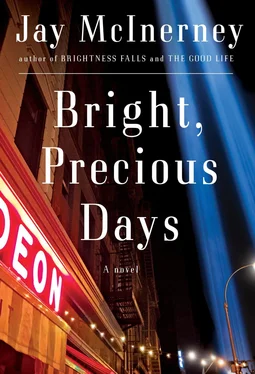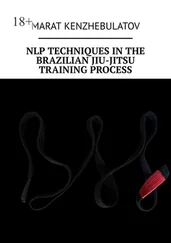“Well, it’s not really me,” Nancy said. “I mean, it is fiction.”
“Of course,” Veronica said. “The plucky blond protagonist bears no resemblance to her creator.”
“I think Jennifer Aniston would be perfect,” Hilary said.
“Too goody-goody,” Nancy said. This subject of who should play Nancy’s alter ego had been a recurring theme for years. So far as Corrine knew, no one had ever proposed an actress whom Nancy hadn’t found fault with.
“What about your movie?” Hilary asked. “The one based on Jeff’s book.”
“I’m not holding my breath. I haven’t heard anything since I turned in the last draft in September.”
“I saw a kid reading the novel on the subway last week,” Veronica said.
Corrine nodded. “Russell says the sales are rising steadily. It’s become a bit of a cult novel on campuses.”
Nancy said, “Did I mention I’m speaking at Vassar next month?”
—
After lunch, Corrine went to the office, where she regretted that glass of Pinot Grigio when she started to doze off in front of her computer. She needed to make sure there were enough volunteers for this week’s Greenmarket food rescue; right now, she was three short. Four days a week, their volunteers scoured the Union Square Greenmarket at closing time for unsold produce. She should have hit up her lunch partners, the salad strippers; she was still irritated at being ambushed like that, but the idea of Hilary or Nancy volunteering was laughable. Yet she’d been moved, in spite of herself, to see her sister, although she didn’t want to do it too often, and she still didn’t think she was a great influence on the kids.
—
At five-fifteen she left to pick up Jeremy at his karate class. He’d resisted most of their attempts to interest him in athletics, but Russell had watched a few samurai movies with him, and most of the weird cartoons and video games he liked seemed to be inspired by Japanese martial arts; karate had dovetailed neatly with the aesthetic of Pokémon and Digimon and Dragon Ball Z. As it turned out, the Japanese hadn’t conquered the United States, as it was feared they might in the mid-eighties when they bought Sony and Rockefeller Center; back then, every best-selling business book was, more or less, some Way of the Samurai knockoff. But they’d definitely achieved a lock on the fantasy life of young American boys.
“The sensei gave me an excellent for my Heian Nidan kata,” he told her, emerging from the dojo with his backpack.
“That sounds very good.”
“It has twenty-six moves and it’s really difficult to master.”
“Way to go, Jeremy.”
“Probably, if somebody tried to mug us on the street, I could take him.”
“Well that’s good to know, but I don’t think there are that many muggers out there.” It used to be a rite of passage; all of her friends had been mugged in the eighties and she’d had a purse snatched on the number 6 train in ’81; Russell had outrun a pair of thugs in the West Village not long after, or so he claimed, but lately you didn’t hear about these things happening in Manhattan.
“Dylan Lefkowitz’s sister got mugged last week,” he said. “Some Hispanic dudes stole her cell phone.”
“Well, I hope you’re not planning on using karate on the street.”
When they arrived home, Storey and Jean were just returning from French club. “Did Russell say anything about dinner tonight?” Corrine asked Jean.
“He say the kids get takeout from Bubby’s. It’s Monday.”
“Oh, damn.” Corrine had forgotten it was date night, a tradition they observed as frequently as they could. She so didn’t feel like it, having already had a big lunch; plus, all of a sudden she felt as if she was finally going to get her period any minute now — having gotten strangely irregular lately after years of twenty-eight-day cycles. She wondered if the girls were right about her being perimenopausal. It’s not that she would miss her period, God knows, but she was afraid of losing some vital aspect of femininity.
After feeding the kids and supervising homework, she and Russell had walked up the street to Odeon, which had been around as long as they had, surviving relentless new trends in cuisine and restaurant design, its retro neon diner facade resembling some lost Edward Hopper painting from the forties, though in fact it had opened its doors in the Reagan era. For Russell, it had the melancholy patina of several fondly remembered meals in the company of Jeff Pierce; there wasn’t that much left of the New York he’d inhabited. For Corrine, who hadn’t been present on most of those boys’ night out occasions, it had the virtues of being a block from their loft and serving a classic chèvre and frisée salad.
There was also the bonus, for him, of being greeted by name by the young woman at the front podium, and escorted to their regular table. Russell was no different from any other denizen of the city in his need to be recognized and coddled in his own corner of the metropolis.
While he and the hostess chatted, her mind drifted to Luke, at his faraway winery. Or maybe he was at the game farm? He’d called a few days ago to say he was coming to town next week. They hadn’t made specific plans, but he’d made it clear he wanted to see her. And while she hadn’t been quite as explicit, she wanted to see him, too, though she couldn’t really justify this sentiment.
Suddenly the hostess was gone and Russell said, “Please don’t tell me Hilary is back in our life.”
“Well, I didn’t make any dates, obviously. And just so you know, I had no idea she was going to be there.”
“Dare I ask what she’s been doing?”
“I told you she broke up with Dan six or seven months ago and now she claims she’s writing a TV pilot.”
“Jesus, that’ll be must-see TV. What, exactly, are her qualifications?”
“Don’t forget, she appeared on two episodes of Law & Order. ”
“So has everybody else we know.”
Desperate to change the subject, she said, “Kohout was quite the conquering hero at Declan’s. He must’ve enjoyed that.”
“Well, why not. He’s earned his moment in the spotlight, I’d say.”
“And he’s soaking it up big-time.”
“What have you got against him, anyway?”
“I don’t know, I’ve always thought he’s very full of himself. I just don’t think he’s a good guy. Plus, I don’t like the idea of your risking all this money on his book.”
“You’ve got to risk it to make it.”
“Your whole business model is based on finding books that the big publishers aren’t chasing. You’re niche, remember?”
“So maybe I want to broaden the niche.”
“What’s that, a paradox? A niche is by definition—”
“Yes, Corrine, I’m aware of the definition.
“Shall we hear the specials?” he asked, turning to beam at the waitress, who’d appeared beside the table.
Corrine excused herself, feeling her period arrive all at once, and walked gingerly to the ladies’ room. For better, and worse, she was still in the game, despite her dear friends’ eagerness to perform last rites on her womanhood.
“ONE DAY I WAS A TEACHING ASSISTANT in Iowa City,” Phillip said, “and then suddenly my picture was in the Times Book Review and I’m on the Today show.”
They were at KGB, an East Village bar known for its literary readings and authentically rude, Russian-style service. Russell had invited him to hear Jack Carson read, and afterward, as the rising star disappeared into the throng of admirers, Phillip was garrulously apologizing to Russell for his long-ago breach of contract while revisiting the days when he, too, had been a celebrated new fiction writer.
Читать дальше












